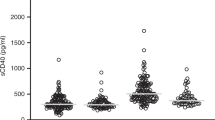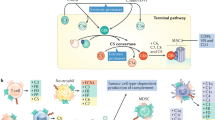Abstract
It has been known for some time that the immune system can recognise growing tumours, and that tumours may respond by modulation of molecules, which make them resistant to further attack. Expression, over-expression, or loss of these molecules may function as markers of tumour progression and prognosis. Among such molecules are the membrane-bound complement regulatory proteins (mCRP), which protect cells from bystander attack by autologous complement. These include CD59 (protectin), which prevents formation of the MAC complex in the terminal stages of complement activation. In the present study, we evaluated immunohistochemical expression of CD59 in a series of over 460 well-characterised colorectal cancers using tissue microarrays (TMA), and related this information to known tumour and patient variables and to survival. The CD59 expression was observed in 69 (15%) of cases overall, and was significantly associated with tumour grade. In contrast, no associations were noted with tumour site, stage or histological type. On survival analysis, a further correlation was observed between expression of CD59 by the colorectal tumours and a reduction in disease-specific patient survival. This observation was strongest for patients with early stage disease. However, a negative impact on survival was also seen in those patients with late stage disease. These results indicate that TMA linked to good clinicopathological databases with good long term follow up are useful tools for determining new prognostic indicators that can be used in future patient management. Immune surveillance may result in immune–editing that induces variable expression of a range of target antigens, and these may be useful prognostic markers. This study has identified CD59 expression as a marker of poor prognosis in colorectal cancer patients.


Similar content being viewed by others
References
Bjorge L, Jensen TS, Matre R (1996) Characterisation of the complement-regulatory proteins decay accelerating factor (DAF, CD55) and membrane cofactor protein (MCP, CD46) on a human colonic adenocarcinoma cell line. Cancer Immunol Immunother 42:185–192
Bjorge L, Vedeler CA, Ulvestad E, Matre R (1994) Expression and function of CD59 on colonic adenocarcinoma cells. Eur J Immunol 24:1597–1603
Camp RL, Charette LA, Rimm DL (2000) Validation of tissue microarray technology in breast carcinoma. Lab Invest 80:1943–1949
Donin N, Jurianz K, Ziporen L, Schultz S, Kirschfink M, Fishelson Z (2003) Complement resistance of human cells depends on membrane regulatory proteins, protein kinases and sialic acid. Clin Exp Immunol 131:254–263
Dunn GP, Old LJ, Schreiber RD (2004) The three Es of cancer immunoediting. Ann Rev Immunol 22:329–360
Durrant LG, Chapman MA, Buckley DJ, Spendlove I, Robins RA, Armitage NC (2003) Enhanced expression of the complement regulatory protein CD55 predicts a poor prognosis in colorectal cancer patients. Cancer Immunol Immunother 52:638–642
Fishelson Z, Donin N, Zell S, Schultz S, Kirschfink M (2003) Obstacles to cancer immunotherapy: expression of membrane complement regulatory proteins (mCRPs) in tumors. Mol Immunol 40:109–123
Gelderman KA, Kuppen PJ, Bruin W, Fleuren GJ, Gorter A (2002) Enhancement of the complement activating capacity of 17-1A mAb to overcome the effect of membrane-bound complement regulatory proteins on colorectal carcinoma. Eur J Immunol 32:128–135
Gelderman KA, Tomlinson S, Ross GD, Gorter A (2004) Complement function in mAb-mediated cancer immunotherapy. Trends Immunol 25:158–164
Gorter A, Meri S (1999) Immune evasion of tumor cells using membrane-bound complement regulatory proteins. Immunol Today 20:576–582
Hosch SB, Scheunemann P, Luth M, Inndorf S, Stoecklein NH, Erbersdobler A, Rehders A, Gundlach M, Knoefel WT, Izbicki JR (2001) Expression of 17-1A antigen and complement resistance factors CD55 and CD59 on liver metastases in colorectal cancer. J Gastrointest Surg 5:673–679
Inoue T, Mizuno M, Uesu T, Ueki T, Tsuji T (1994) Distribution of complement regulatory proteins, decay-accelerating factor, CD59/homologous restriction factor 20 and membrane cofactor protein in human colorectal adenoma and cancer. Acta Med Okayama 48:271–277
Inoue T, Yamakawa M, Takakhashi T (2002) Expresssion of complement regulating factors in gastric cancer cells. J Clin Pathol Mol Pathol 55:193–199
Juhl H, Helmig F, Baltzer K, Kalthoff H, Henne-Bruns D, Kremer B (1997) Frequent expression of complement resistance factors CD46, CD55, and CD59 on gastrointestinal cancer cells limits the therapeutic potential of monoclonal antibody 17-1A. J Surg Oncol 64:222–230
Jurianz K, Maslak S, Garcia-Schuler H, Fishelson Z, Kirschfink M (1999) Neutralization of complement regulatory proteins augments lysis of breast carcinoma cells targeted with rhumAb anti-HER2. Immunopharmacology 42:209–218
Kononen J, Bubendorf L, Kallioniemi A, Barlund M, Schraml P, Leighton S, Torhorst J, Mihatsch MJ, Sauter G, Kallioniemi OP (1998) Tissue microarrays for high throughput molecular profiling of tumour specimens. Nat Med 4:844–847
Koretz K, Bruderlein S, Henne C, Moller P (1993) Expression of CD59, a complement regulator protein and a second ligand of the CD2 molecule, and CD46 in normal and neoplastic colorectal epithelium. Br J Cancer 68:926–931
Lachmann PJ (1991) The control of homologous lysis. Immunol Today 12:312–315
Madjd Z, Durrant LG, Bradley R, Spendlove I, Ellis IO, Pinder SE (2004) Loss of CD55 is associated with aggressive breast tumors. Clin Cancer Res 10:2797–2803
Madjd Z, Durrant LG, Pinder SE, Ellis IO, Ronan J, Lewis S, Rushmere NK, Spendlove I (2005) Do poor-prognosis breast tumors express membrane cofactor proteins (CD46)? Cancer Immunol Immunother 54:149–156
Madjd Z, Pinder SE, Paish C, Ellis IO, Carmichael J, Durrant LG (2003) Loss of CD59 expression in breast tumors correlates with poor survival. J Pathol 200:633–639
Madjd Z, Spendlove I, Pinder SE, Ellis IO, Durrant LG (2005) Total loss of MHC class I is an independent indicator of good prognosis in breast cancer. Int J Cancer (e-pub ahead of print)
Maio M, Brasoveanu LI, Coral S, Sigalotti L, Lamaj E, Gasparollo A, Visintin A, Altomonte M, Fonsatti E (1998) Structure, distribution, and functional role of protectin (CD59) in complement-suceptibility and in immunotherapy of human malignancies. Int J Oncol 13:305–318
Meri S, Waldmann H, Lanchman PJ (1991) Distribution of protectin (CD59), a complement membrane attack inhibitor, in normal human tissue. Lab Invest 65:532–537
Muller-Eberhard HJ (1986) The membrane attack complex of complement. Ann Rev Immunol 4:503–528
National Institute for Clinical Excellence (2004) Improving outcomes in colorectal cancers: manual update. NICE, London
Niehans GA, Cherwitz DL, Staley NA, Knapp DJ, Dalmasso AP (1996) Human carcinomas variably express the complement inhibitory proteins CD46 (membrane cofactor protein), CD55 (decay accelerating factor), and CD59 (protectin). Am J Pathol 149:129–142
Quinn M, Babb P, Brock A, Kirby L, Jones J (2001) Cancer trends in England and Wales 1950–1999. The stationary office, London
Schmitt CA, Schwaeble W, Wittig BM, Meyer zum Buschenfelde KH, Dippold WG (1999) Expression and regulation by interferon-γ of the membrane-bound complement regulators CD46 (MCP), CD55 (DAF) and CD59 in gastrointestinal tumors. Eur J Cancer 35:117–124
Thorsteinsson L, O‘Dowd G, Harrington PM, Johnson PM (1998) The complement regulatory proteins CD46 and CD59 but not CD55, are highly expressed by glandular epithelium of human breast and colorectal tumor tissues. APMIS 106:869–878
Torhorst J, Bucher C, Kononen J, Hass P, Zuber M, Kochli OR, Mross F, Dieterich H, Moch H, Mihatsch M, Kallioniemi OP, Sauter G (2001) Tissue microarrays for the rapid linking of molecular changes to clinical endpoints. Am J Pathol 159:2249–2256
Xu C, Jung M, Burkhardt M, Stephan C, Schnorr D, Loening S, Jung K, Dietel M, Kristiansen G (2005) Increased CD59 protein expression predicts a PSA relapse in patients after radical prostatectomy. Prostate 62:224–232
Acknowledgements
We thank Mr John Ronan for technical assistance.
Author information
Authors and Affiliations
Corresponding author
Additional information
This article is a symposium paper from the "Robert Baldwin Symposium: 50 years of Cancer Immunotherapy", held in Nottingham, Great Britain, on 30th June 2005.
Rights and permissions
About this article
Cite this article
Watson, N.F.S., Durrant, L.G., Madjd, Z. et al. Expression of the membrane complement regulatory protein CD59 (protectin) is associated with reduced survival in colorectal cancer patients. Cancer Immunol Immunother 55, 973–980 (2006). https://doi.org/10.1007/s00262-005-0055-0
Received:
Accepted:
Published:
Issue Date:
DOI: https://doi.org/10.1007/s00262-005-0055-0




